Billions of people have ended up with the wrong partner for thousands of years and could not simply leave – out of financial dependency, social convention or sometimes even a sense of responsibility. Why has a woman been worried for a quarter of a century if it was no different?
Pablo Larraín’s film about this woman, Lady Diana Spencer, has an answer to that. “Spencer” tells of Diana’s last Christmas with the royal family at Sandringham Castle, where she engages in a silent rebellion – by being late, wearing the wrong clothes, and vomiting in toilet bowls. Lady Di is embodied by Kristen Stewart, who herself has been a somewhat tragic figure since her love affairs were exposed in public.
Charles takes Diana aside once in the billiards room and says, “What you don’t understand is that we have to exist twice. One public person and one human – the people don’t want us to be human.” But that’s exactly why the people loved her – that she threw etiquette overboard and let her quirks run free. In the scene, however, he says something else when she complains that the gossip press is only chasing her. My curtains, says Charles, are always drawn.
Of all the films in the competition at the 78th Venice Film Festival, “Spencer” is the closest to a German competition entry; There is a lot of German funding in the project, Sandringham Castle is being doubled by Friedrichshof Castle in Hesse, among other things. One could argue that the castle plays the second leading role – “Spencer” stays in one place, and Larraín avoids the annoying omnipresence of the rest of the royal family by only allowing Charles and the Queen to perform properly. Otherwise everything revolves around Diana, in whom the thought matures to finally run away – at the beginning of the film she already escaped and secretly drove off from Kensington in her sports car, even if she doesn’t really find the way and the people in one Café shocked when she just walks in there to ask where the hell she is.
In this film, Diana is constantly brushed for riot
The Chilean Pablo Larraín – among other things, he made the film “El Club” about sexual abuse in the Catholic Church, which won the Jury’s Grand Prize at the 2015 Berlinale – calls his “Spencer” in the opening credits a fable inspired by true tragedy. So he’s speculating, figuring out what might have happened in Sandringham at that last Christmas party together.
Larraín’s Diana is not only lovely, he stages her as annoying and off the beaten track, constantly brushed for riot. Kristen Stewart plays this brilliantly, just in such a way that you still like her and don’t wonder if it really is such a grisly fate when an army of kitchen helpers is assigned to, for God’s sake, fabricate something to eat from the food supplied by the military what she, alone she, really wants.
The lost girl wants all the clothes, but Diana doesn’t like being told which to wear; and the traditions and dusty rules of the royal house get on her mind. But even worse, she finds the permanent control – especially by Major Gregory (Timothy Spall), who was brought in to keep the approaching scandal in check with soldier devotion. But Diana doesn’t play along: Everything she does and says is passed on right away, there is a reaction as soon as she undresses in front of open curtains or locks up in the toilet, where she spits out the wonderful soufflés and cream soups, unable to see how much Caring is behind the control.
The result is not a pure homage to Lady Di on the canvas, but the ambivalent portrait of a fragile woman and passionately loving mother who refrains from blaming. The Queen and the Major tell her the same thing in different ways – she is a servant of the people. She is too capricious for that. She doesn’t want to serve, she wants to be loved. Free spirit meets military order, and order wins.
There are moments when you think that Larraín has got lost in the Diana myth – the imagined Ann Boleyn, for example, is a balancing act on the verge of kitsch: Diana sees her as a sister in spirit, even though no one really wants to shrink her head. But Larraín keeps turning elegantly. Taken for himself, beyond all comparison with reality, he made a wonderful film.
The question is, do you really believe Diana was as witty and funny as Larraín imagines she was. She once chased a maid out of the bedroom who was clearly spying on her for the monarchy guards by saying in a bitchy, reserved tone: “Please go, I want to masturbate.” Could this dialogue be trusted by the real Diana? Maybe not. She wasn’t that cool. That was the problem.

